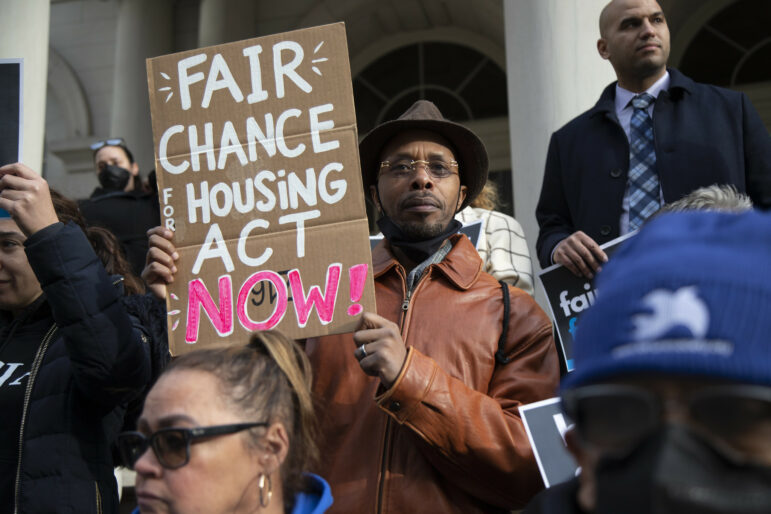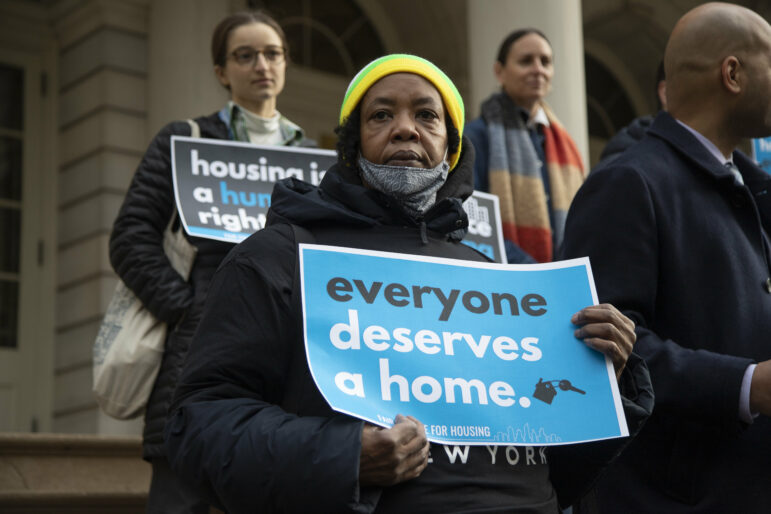The New York City Council held a hearing Thursday to discuss the Fair Chance for Housing Act, which would make it illegal for landlords and realtors to factor in criminal backgrounds when considering a tenant. Supporters say stable housing is key to preventing recidivism, but critics have slammed the bill, citing safety concerns.

John McCarten/NYC Council
Supporters of the Fair Chance for Housing bill rallied this week outside City Hall.
Lea la versión en español aquí.
The New York City Council held a hearing Thursday to discuss the Fair Chance for Housing Act, which would make it illegal for landlords and realtors to factor in criminal backgrounds when considering a tenant.
As of now, landlords can deny someone with past criminal records, which advocates say leaves thousands of previously incarcerated New Yorkers subject to housing discrimination—making it harder for them to successfully rebuild their lives and stay out of jail or prison. The act was initially introduced last year, but has gotten pushback from conservative lawmakers and residents concerned about safety.
Approximately 750,000 New York City residents have a conviction history, nearly 11 percent of the city’s adult population, according to the Data Collaborative for Justice at John Jay. Those with a record already face significant hurdles to finding stable housing in a city like New York, where rents have rebounded to record highs this year and where competition for an affordable apartment can be cutthroat. Each year, thousands of residents cycle from the streets and shelters to Rikers Island jails, with few housing options after their release.
“It really hit me hard because when you come home you want independence. I actually cried,” said Roslyn Smith, who was incarcerated for 39 years before her release in 2018. She applied for an apartment in Harlem, she said, but didn’t get a response for weeks, and was eventually denied because of her criminal history. “I was just so distraught and frustrated,” Smith said. She is now living in Brooklyn after joining a lease with a friend.
Leah Faria, who was incarcerated for 22 years, said she was forced to move back in with her mother after getting out. Faria then got into contact with the director of Providence House, a nonprofit that provides support housing and other services to formerly incarcerated and homeless women, and was able to secure a place to live. “I needed to have a safe space for me to rest my head,” she said.
But programs like that are few and far between, and supportive housing facilities specifically geared to people with past involvement in the criminal justice system have been met with backlash from neighbors, as has been the case for a 50-unit project currently proposed in The Bronx.
Besides turning to family members, formerly incarcerated New Yorkers often end up in the shelter system. Hilton N. Webb Jr. was released to a men’s shelter after serving more than 27 years in prison, he said. But he was soon eager to get out of the shelter facility: Webb’s roommate did not allow him to turn on the lights, he said, and there were residents doing the narcotic K2 in the shelter bathroom. Webb eventually found his way to a spot in a supportive housing program run by the Fortune Society—the same provider behind the similar project planned for The Bronx—and moved there in 2017.
The group is one of several advocacy organizations campaigning for passage of the Fair Chance act. “People with convictions are already our neighbors,” said Fortune Society’s Andre Ward, who is responsible for the group’s legislative and policy work. Many of them, like Webb, end up in the crowded shelter system, what supporters say can be costlier in the long run than a supportive housing unit.
Likewise, a report issued earlier this year by the Corporation for Supportive Housing (CSH) estimated that it costs the city $1.4 billion a year to house the approximately 2,589 people incarcerated on Rikers Island who would likely be eligible for supportive housing, which could instead house them at just $108 million annually. “There’s no scientific proof that someone who has [a] conviction history will be a bad tenant,” Ward said.
But concerns about public safety have made the Fair Chance act a hard sell for some. Several groups, including Women for Safe New York and Families for NYC, held a rally against the ban on criminal background checks Wednesday on the steps of City Hall. “The co-ops boards and landlords in our communities will not be able to guarantee the safety, decent quality of life, and investment of its residents,” if the legislation is passed, reads a statement on the bill released by the Fordham Hill Owners Corp., the shareholders at a co-op development adjacent to the Harlem River in The Bronx.
“Abandon this bill or we will abandon you come reelection time,” the coalition opposing the legislation stated in a press release. At the hearing Thursday, conservative councilmembers similarly assailed the measure as a threat to tenants and landlords that strips property owners of their right to vet potential renters.
“The real crux of this is you are taking away the rights of the landlords to do what is rightfully your right and that is to perform background checks,” said Queens Councilmember Vickie Paladino, a far-right Republican. “We’re talking about murderers and rapists and pedophiles that are going to live next door to us.”

John McCarten/NYC Council Media Unit
Councilmembers and advocates rally for the Fair Chance For Housing bill Thursday morning.
The law, however, does not apply to two-family owner-occupied homes or to individuals on the sex offender registry. Brooklyn Councilmember Inna Vernikov said the bill endangers New Yorkers, with “crime at an all time high” (a false claim, based on NYPD data on year-by-year felony and misdemeanor offenses.)
Guidance from the federal Department of Housing and Urban Development (HUD) discourages criminal background checks, citing studies determining that “criminal history is not a good predictor of housing success.”
The city’s Human Rights Law already bans most employers from factoring in a prospective employee’s criminal background during hiring, the result of City Council legislation passed in 2015 and expanded since.
NYC Commission on Human Rights Commissioner Annabel Palma said Thursday that the “administration supports the intent” of the Fair Chance for Housing Act, but stopped short of backing the legislation before the Council. Mayor Eric Adams’ administration, she said, “also supports public safety and wants to make sure the bill aligns with that priority.”
Queens Councilmember Shekar Krishnan countered those safety concerns, aruging that denying housing based on criminal history masks racial discrimination, since Black New Yorkers account for the vast majority of people held in city jails and state prisons.
“We’re in the middle of a housing crisis and we’re not going to solve that crisis by making it harder for people to find a home,” he said. “People in homes equal safer communities.”








